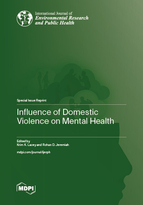Influence of Domestic Violence on Mental Health
A special issue of International Journal of Environmental Research and Public Health (ISSN 1660-4601). This special issue belongs to the section "Mental Health".
Deadline for manuscript submissions: closed (1 November 2022) | Viewed by 31460
Special Issue Editors
Interests: intimate partner violence; mental and physical health; race and ethnicity; migration; Caribbean studies; inequality
Special Issues, Collections and Topics in MDPI journals
Special Issue Information
Dear Colleagues,
We are extending this Special Issue call for papers on an important pervasive social problem that impacts the health and well-being of individuals. Characterized by such acts as physical abuse, psychological/emotional abuse, sexual abuse, economic abuse, and child abuse (ACE), years of research has indicated that that domestic violence can negatively and profoundly affect the mental health of its victims. As studies continue to illuminate the consequences of domestic violence, the scientific literature is still limited on: (1) the underlying factors that might exacerbate the intersection between domestic violence and mental health—a particular focus on the type of violence (i.e., physical, emotional, sexual abuse); and mental health outcomes (i.e., substance use, anxiety disorders, suicide); (2) whether certain (i.e., marginalized, vulnerable, and underrepresented) populations might exhibit unique mental health outcomes; and (3) how social and contextual factors (i.e., neighborhood characteristics, migratory factors, disaster/hazard-prone settings, discrimination) mitigate the relationship between domestic violence and mental health. We therefore call for papers that examine the relationship between domestic violence on mental health in order to expand and further our understanding of the association to inform the development of interventions. We especially welcome unpublished research that addresses social and contextual influences at that intersection specifically for underrepresented populations in the global context.
Dr. Krim K. Lacey
Dr. Rohan D. Jeremiah
Guest Editors
Manuscript Submission Information
Manuscripts should be submitted online at www.mdpi.com by registering and logging in to this website. Once you are registered, click here to go to the submission form. Manuscripts can be submitted until the deadline. All submissions that pass pre-check are peer-reviewed. Accepted papers will be published continuously in the journal (as soon as accepted) and will be listed together on the special issue website. Research articles, review articles as well as short communications are invited. For planned papers, a title and short abstract (about 100 words) can be sent to the Editorial Office for announcement on this website.
Submitted manuscripts should not have been published previously, nor be under consideration for publication elsewhere (except conference proceedings papers). All manuscripts are thoroughly refereed through a single-blind peer-review process. A guide for authors and other relevant information for submission of manuscripts is available on the Instructions for Authors page. International Journal of Environmental Research and Public Health is an international peer-reviewed open access monthly journal published by MDPI.
Please visit the Instructions for Authors page before submitting a manuscript. The Article Processing Charge (APC) for publication in this open access journal is 2500 CHF (Swiss Francs). Submitted papers should be well formatted and use good English. Authors may use MDPI's English editing service prior to publication or during author revisions.
Keywords
- Domestic violence
- Mental health
- Social context
- Environmental conditions
- Systems of oppression
- Underrepresented populations
- Vulnerable groups







